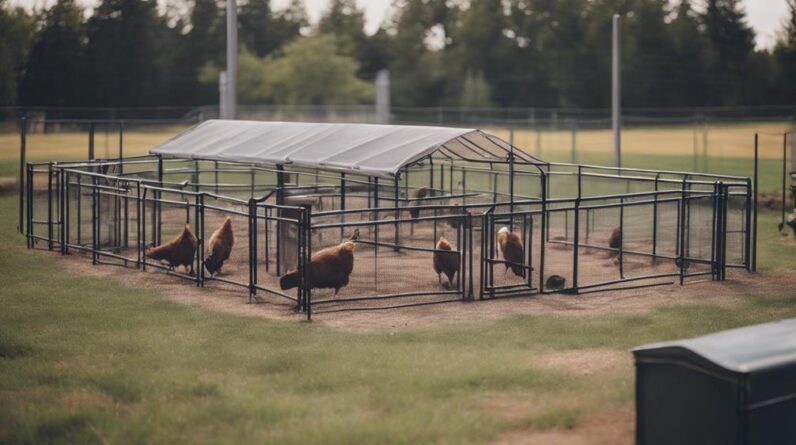
Did you know that the global emu farming industry is estimated to be worth over $300 million? With such a significant market size, it's no wonder that more and more entrepreneurs are considering venturing into this unique business.
However, before you jump headfirst into emu farming, it's important to understand the profitability and challenges that come with it. From market demand for emu products to the key challenges faced by emu farmers, this discussion will explore the various factors that can impact your success in the emu farming industry.
So, if you're curious about whether emu farming is a lucrative business opportunity or if it's riddled with obstacles, keep reading to uncover the realities of this fascinating industry.
Key Takeaways
- Emu farming offers significant profitability potential, with the global industry worth over $300 million and increasing demand for emu products such as meat, oil, and feathers.
- Emu products, such as meat and oil, have gained popularity among health-conscious consumers and the beauty and wellness industry, presenting diversification opportunities for emu farmers.
- Emu farming requires specialized knowledge and expertise in emu husbandry and management practices, as well as compliance with legal regulations and animal welfare and biosecurity measures.
- Effective marketing strategies, including digital advertising, social media engagement, and collaborations with influencers, can help emu farmers promote their products and build brand loyalty.
Potential Profitability of Emu Farming
Emu farming offers potential profitability through various revenue streams, making it an attractive venture for those seeking a practical and data-driven agricultural opportunity. The market potential for emu farming is significant, with increasing demand for emu products such as meat, oil, and feathers. Emu meat, known for its low fat content and high protein, is gaining popularity among health-conscious consumers. The market for emu oil, renowned for its medicinal and cosmetic properties, is also growing rapidly. Additionally, emu feathers are sought after by the fashion and craft industries for their unique aesthetic appeal.
To tap into the profitability of emu farming, it's crucial to understand the market dynamics and consumer preferences. Analyzing consumer trends and market research data can help identify the most profitable products and target customer segments. Furthermore, investing in efficient farming practices, such as proper nutrition, healthcare, and breeding techniques, can enhance the quality and quantity of emu products, thereby increasing profitability.
However, it's important to note that the profitability of emu farming isn't without its challenges. It requires substantial investment in infrastructure, equipment, and initial breeding stock. Additionally, managing the health and well-being of emus requires specialized knowledge and expertise. Market fluctuations and competition can also impact the profitability of emu farming.
Market Demand for Emu Products
To capitalize on the potential profitability of emu farming, it's crucial to understand the market demand for emu products and align your production accordingly. Here are three key points to consider:
- Emu meat market: The demand for emu meat has been steadily increasing in recent years. Health-conscious consumers are seeking alternative sources of lean protein, and emu meat fits the bill perfectly. It's low in fat, cholesterol, and calories while being rich in iron, vitamin B12, and omega-3 fatty acids. As a result, it has gained popularity among fitness enthusiasts, athletes, and those following special diets. Additionally, the unique taste and texture of emu meat make it an exciting option for culinary enthusiasts.
- Emu oil popularity: Emu oil has gained significant popularity in the beauty and wellness industry. Its natural anti-inflammatory properties, ability to penetrate the skin deeply, and high levels of essential fatty acids have made it a sought-after ingredient in skincare products. Emu oil is believed to moisturize, soothe, and rejuvenate the skin, making it highly desirable for individuals dealing with skin conditions such as eczema, psoriasis, and dryness.
- Diversification opportunities: Understanding the market demand for emu products can help you diversify your offerings. For example, you can develop value-added products like emu feathers, which are used in crafts and fashion accessories. Additionally, there's a growing demand for emu eggs, which can be sold as ornamental pieces or used in artistic creations.
Key Challenges Faced by Emu Farmers

One of the key challenges faced by emu farmers is the need for specialized knowledge and expertise in emu husbandry and management practices. Emus are unique birds that require specific care and handling techniques. Without the proper understanding of their behavior, feeding habits, and health requirements, it can be difficult to ensure their well-being and maximize productivity.
Another challenge that emu farmers face is navigating the legal regulations surrounding emu farming. Each country or region may have its own set of rules and regulations governing the farming and selling of emus and their products. These regulations can vary greatly, from obtaining permits and licenses to following specific guidelines for animal welfare and biosecurity measures. It's imperative for emu farmers to stay updated with these regulations and ensure compliance to avoid legal issues and penalties.
Predator control is also a significant challenge for emu farmers. Emus are vulnerable to attacks from predators such as foxes, dogs, and wild cats. Fencing and other physical barriers can provide some protection, but proactive measures must be taken to prevent predator attacks. This may include implementing deterrents such as noise devices, guard animals, or even employing professional trappers if necessary.
Financial Considerations for Starting an Emu Farm
Navigating the challenges of emu farming, such as specialized knowledge and predator control, is essential for success, but it's equally important to consider the financial aspects of starting an emu farm. To ensure that you make informed decisions, here are three key financial considerations to keep in mind:
- Cost Analysis: Conduct a thorough cost analysis to understand the expenses involved in starting and maintaining an emu farm. Consider factors such as land acquisition, construction of enclosures, purchase of emu chicks, feed, veterinary care, and marketing expenses. Analyze the potential returns on investment and determine the breakeven point for profitability.
- Funding Options: Explore different funding options available to you. Traditional options such as bank loans or personal savings can be considered, but also research alternative sources like grants, agricultural programs, or crowdfunding platforms specifically tailored for farming ventures. Evaluate the terms and conditions of each funding option and choose the one that aligns best with your financial goals.
- Financial Planning: Develop a comprehensive financial plan that includes projected revenue, expenses, and cash flow projections for at least the first few years of operation. This will help you anticipate financial challenges and make necessary adjustments to your operations. Additionally, consider consulting with a financial advisor or accountant with experience in the agricultural sector to ensure sound financial management practices.
Effective Marketing Strategies for Emu Products

Implementing effective marketing strategies is crucial for maximizing the sales and profitability of emu products. In today's digital age, utilizing digital advertising and social media promotion can significantly enhance the visibility and reach of your emu products.
Digital advertising allows you to target specific demographics and interests, ensuring that your message reaches the right audience. By leveraging social media platforms such as Facebook, Instagram, and Twitter, you can engage with potential customers on a more personal level and build brand loyalty. Create compelling content such as product photos, videos, and testimonials to showcase the unique benefits of your emu products. Encourage customers to share their experiences and feedback on social media, amplifying your brand message organically.
It's also essential to collaborate with influencers or bloggers who have a strong online presence and align with your brand values. They can help promote your emu products to their followers, increasing brand awareness and driving sales. Additionally, consider running targeted ads on social media platforms to reach a wider audience.
Analyze the data from your digital advertising campaigns to optimize your marketing efforts and identify areas for improvement. By leveraging the power of digital advertising and social media promotion, you can effectively market your emu products and maximize your sales potential.
Tips for Success in the Emu Farming Industry
To achieve success in the emu farming industry, it's crucial to focus on key factors such as proper breeding techniques, effective disease management, and efficient feed and nutrition practices.
Here are three tips to help you succeed in the emu farming industry:
- Master breeding techniques: Emus are known for their reproductive capabilities, but it's important to understand the intricacies of breeding to ensure healthy offspring. Familiarize yourself with the emu's reproductive cycle, including incubation periods and fertility rates. Implement proper breeding practices, such as pairing compatible emus and monitoring their behavior during mating. This will increase the chances of successful breeding and improve the overall health of your flock.
- Prioritize health management: Emus, like any livestock, are susceptible to diseases and infections. Establish a robust health management plan that includes regular check-ups, vaccinations, and preventive measures against common ailments. Maintain a clean and hygienic environment to prevent the spread of diseases. Early detection and prompt treatment are essential to minimize the impact on your flock's health and productivity.
- Optimize feed and nutrition practices: Emus require a balanced diet to thrive. Consult with experts or conduct research to determine the appropriate feed composition and nutritional requirements for emus at different stages of development. Provide a variety of fresh and high-quality feed, including grains, vegetables, and proteins. Regularly monitor your emus' weight and adjust their diet accordingly to ensure optimal growth and health.
Frequently Asked Questions
What Is the Average Lifespan of an Emu?
The average lifespan of an emu is around 10-20 years. Emu breeding patterns and nutritional requirements play a crucial role in ensuring their longevity. Understanding these factors is vital for successful emu farming.
How Long Does It Take for Emus to Reach Maturity?
It typically takes emus around 18-24 months to reach maturity. Emu breeding strategies and the economic viability of emu farming depend on this timeframe for profitability.
Can Emus Be Raised in Colder Climates?
Emus can indeed be raised in colder climates, but it requires special techniques. Emu farming in these regions involves providing adequate shelter, adjusting feeding requirements, and ensuring proper insulation.
Are There Any Government Regulations or Permits Required for Starting an Emu Farm?
To start an emu farm, you must be aware of the government regulations and permits required. These play a crucial role in ensuring the profitability and success of your venture. It's important to understand the challenges and plan accordingly.
What Are the Common Diseases or Health Issues That Emus May Face, and How Can They Be Prevented or Treated?
Emus can face various health issues, such as respiratory problems and parasites. To prevent diseases, maintain a clean environment and provide proper nutrition. If a health issue arises, consult a veterinarian for treatment options.
Conclusion
Congratulations! You've reached the end of this informative journey into the world of emu farming.
Just like an emu's stride, success in this industry requires determination and adaptability. Embrace the challenges and opportunities that come your way, for in the vast landscape of market demand and profitability, your emu farm can soar to great heights.
Remember, with the right financial considerations and effective marketing strategies, your emu farm can be a feather in your cap.
Happy farming!





